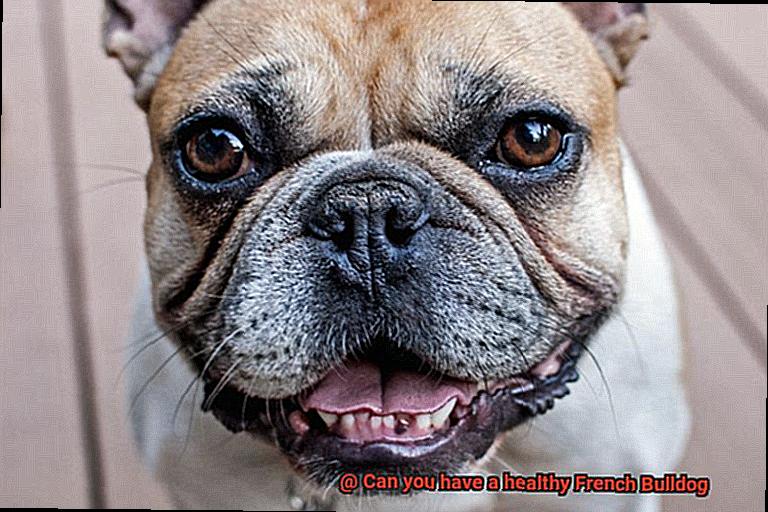Beyond Diet – Additional Care Tips for Healthy French Bulldogs
- The importance of regular exercise in keeping them fit and preventing obesity
- Proper grooming techniques for their short coat and overall hygiene
- Monitoring respiratory health due to their brachycephalic anatomy

- Responsible breeding practices for healthier offspring
Keeping Your French Bulldog Physically Fit
Today, we’re going to talk about a topic near and dear to our hearts – keeping our furry friends physically fit. You see, French Bulldogs are not your average athletes. With their adorable flat faces and unique body structure, they require a special approach when it comes to exercise.
So why is regular exercise so important for our Frenchies? Well, let me break it down for you. French Bulldogs, being a brachycephalic breed, can often struggle with respiratory issues and regulating their body temperature. Regular exercise helps keep their weight in check, improves their cardiovascular health, and overall fitness. Plus, it’s a great way to bond with your furball.
Now that we understand the importance of exercise, let’s dive into the types of activities that are suitable for our Frenchies. High-impact activities like marathon running may not be the best fit for them. Instead, they thrive in low-impact exercises such as brisk walks, gentle hikes, swimming, and interactive play sessions. It’s all about finding the right balance between keeping them active and not overexerting them.
But how much exercise is enough? Well, every Frenchie is unique, just like us. On average, they should get around 30 minutes to an hour of exercise per day. But hey, don’t stress if you can’t do it all in one go – split it up into multiple sessions throughout the day. And remember, always listen to your pup. If they seem tired or are panting excessively, take a break and let them cool down.

Speaking of cooling down, it’s important to monitor our Frenchies during exercise. Due to their unique anatomy, they can overheat easily. So keep an eye out for excessive panting, wheezing, or difficulty breathing – these are signs that your Frenchie needs a breather.

Exercise isn’t just about physical fitness, my friends. Mental stimulation is just as important for our intelligent Frenchies. Incorporate puzzle toys, obedience training sessions, and interactive games into their routine to keep those little minds sharp and their spirits high.
As our French Bulldogs age, their exercise needs may change. Just like us, they may have less energy and develop certain health conditions. It’s crucial to consult with your veterinarian and adapt their exercise routine accordingly. We want them to stay safe and healthy throughout their golden years too.
Grooming Requirements for French Bulldogs
Today, we’re going to dive into the wonderful world of grooming requirements for our beloved Frenchie friends. As an expert in all things Frenchie, I’m here to share some valuable insights on how to keep your furry companion looking and feeling their best.
Brushing: The Key to a Lovely Coat
French Bulldogs have short, smooth coats that are low-shedding, but that doesn’t mean they don’t need regular brushing. Grab a soft-bristle brush or a grooming glove and give your Frenchie a good once-over at least once a week. Not only does this remove loose hair, but it also helps distribute their natural oils, giving their coat that beautiful shine.
Bath Time: Keepin’ It Clean Without Overdoing It
While bath time is important, we don’t want to overdo it with our Frenchies. Excessive bathing can strip their coat of essential oils, leading to dry skin and other skin issues. Aim for a bath once every 2-3 months or when they start smelling a little funky. Remember to use a mild dog shampoo that is gentle on their sensitive skin.
Nailing Those Nails: Trim with Care
Trimming your Frenchie’s nails is crucial for their comfort and overall health. Long nails can be uncomfortable for them and may even cause joint problems. Invest in a good nail clipper or grinder designed for dogs and trim those nails regularly. If you’re unsure about the process, don’t hesitate to seek help from a professional groomer or veterinarian.
Ears and Teeth: Don’t Forget the Details
French Bulldogs are prone to ear infections due to their adorable floppy ears. Keep an eye on their ears for any signs of redness, swelling, or discharge. Clean them gently with a veterinarian-approved ear cleaner to prevent infections. And let’s not neglect those pearly whites. Regular toothbrushing using a dog toothbrush and toothpaste is essential for preventing dental issues like plaque buildup and gum disease.
Wrinkle Patrol: Keep Those Wrinkles Fresh
Ah, those adorable wrinkles on our Frenchie’s face. While they’re undeniably cute, they can also trap dirt, moisture, and bacteria if not properly cared for. Regularly check and clean their facial folds with a damp cloth or special cleaning wipes to keep their skin healthy and happy.
Remember, establishing a regular grooming routine is essential for the well-being of your French Bulldog. Not only will it keep them clean and comfortable, but it also provides an opportunity for bonding and a little extra pampering. So grab that brush, run that bathwater, and let’s keep our Frenchies fresh and fabulous.
Regular Veterinary Care for Healthy French Bulldogs
French Bulldogs make wonderful companions, but they are also prone to certain health issues that require regular veterinary care. As a responsible owner, it is important to prioritize your Frenchie’s well-being by scheduling regular check-ups with a qualified veterinarian. In this section, we will explore why regular veterinary care is essential for maintaining the health of your French Bulldog.
Monitoring Overall Health:
During regular check-ups, your veterinarian will perform a thorough physical examination to assess your Frenchie’s overall health. They will check their body condition, eyes, ears, teeth, heart, lungs, and joints. This helps detect any potential issues early on and allows for prompt treatment.
Preventive Measures:
French Bulldogs require specific preventive measures to keep them healthy. Your veterinarian may recommend vaccinations to protect against common diseases. Additionally, parasite control is crucial to prevent fleas, ticks, and worms from causing harm to your furry friend. Regular dental care is also important to maintain oral hygiene and prevent dental disease.
Early Detection and Treatment:
Regular veterinary visits allow for early detection and treatment of any health problems before they become more serious or potentially life-threatening. Diagnostic tests, such as routine bloodwork, can help assess organ function and detect underlying conditions that may not be apparent during a physical examination.
Reproductive Health:
Unless you plan on breeding your French Bulldog, it is advisable to have them spayed or neutered. This helps prevent certain reproductive-related health issues and contributes to overall population control.
Expert Guidance:
Establishing a good rapport with a trusted veterinarian who has experience with French Bulldogs is essential. They can provide valuable guidance on nutrition, exercise, behavior training, and other aspects of your dog’s care. Their expertise ensures that you are giving your Frenchie the best possible care.
Remember that regular veterinary care is just one aspect of maintaining a healthy French Bulldog. Providing proper nutrition, regular exercise, mental stimulation, and a safe living environment are equally important for their overall well-being.
By prioritizing regular veterinary care, you are taking proactive steps to keep your French Bulldog healthy and happy for years to come. So, don’t wait any longer – schedule that check-up with your veterinarian today.
Breathing Difficulties in French Bulldogs
These adorable pups are prone to a condition called brachycephalic airway syndrome, which affects their ability to breathe properly. In this blog post, we’ll dive into the causes of breathing difficulties in French Bulldogs and explore measures that can be taken to alleviate these issues, ensuring your furry friend can breathe easy.
Understanding the Causes:
- Stenotic Nares: One of the main culprits behind breathing difficulties in French Bulldogs is stenotic nares, or narrowed nostrils. This condition restricts airflow, making it harder for them to breathe through their nose.

- Elongated Soft Palate: The soft palate at the back of the throat can be too long in French Bulldogs, obstructing their airway. This can lead to snoring, gagging, or even choking episodes.
- Tracheal Collapse: Weakened or deformed windpipes can cause partial or complete collapse of the airway, exacerbating breathing difficulties and resulting in coughing or wheezing.

Alleviating Breathing Difficulties:

- Regular Vet Visits: Early detection is key to managing breathing issues. Regular visits to your veterinarian will help identify any abnormalities and ensure proper management.
- Surgical Interventions: In some cases, surgical procedures may be necessary to correct anatomical abnormalities and improve your French Bulldog’s breathing.
- Cool and Well-Ventilated Environment: French Bulldogs are more prone to overheating due to their compromised respiratory system. Ensure they have access to a cool and well-ventilated environment to prevent further distress.

- Moderate Exercise: While exercise is important for overall health, it should be moderate and monitored for French Bulldogs. Avoid excessive exertion that could strain their compromised airways.
- Weight Management: Maintaining a healthy weight is crucial for French Bulldogs. Extra pounds can put additional strain on their already compromised airways. A balanced diet, appropriate portion sizes, and tailored exercise can help prevent obesity and respiratory distress.
Responsible Breeding Practices for Healthy French Bulldogs
Due to their unique physical characteristics, they are prone to certain health issues. Responsible breeding practices are crucial in ensuring the health and well-being of French Bulldogs. In this article, we will explore the importance of responsible breeding practices and how they contribute to the overall health of these beloved dogs.
Choosing a Reputable Breeder:
- Look for breeders who prioritize the health of their dogs and follow responsible breeding practices.
- Ensure that the breeder conducts health screenings on their breeding dogs to check for hereditary conditions commonly found in French Bulldogs.
- Ask if the breeder tests for conditions such as hip dysplasia, patellar luxation, and brachycephalic syndrome.
Genetic Health Screening:
- Responsible breeders will screen their breeding dogs for genetic disorders such as eye diseases, heart conditions, and allergies.
- By selecting breeding pairs that are free from these conditions, the risk of passing them on to the puppies is significantly reduced.
Selection of Breeding Pairs:
- A responsible breeder carefully selects breeding pairs based on their health and genetic background.

- Factors such as temperament, conformation, and overall health are considered to ensure that the puppies have the best chance of being healthy.
Avoiding Exaggerated Features:
- Breeding French Bulldogs with excessively flat faces can lead to breathing difficulties, eye problems, and dental issues.
- Responsible breeders will focus on breeding dogs with a more moderate conformation to minimize these health risks.
Proper Care and Socialization:
- Responsible breeders provide proper care and socialization for both parent dogs and puppies.
- This includes regular veterinary check-ups, appropriate nutrition, exercise, mental stimulation, and a clean and safe environment.
Vaccinations and Deworming:

- Responsible breeders ensure that their puppies receive necessary vaccinations and deworming treatments before going to their new homes.
- Documentation of these treatments should be provided to the new owners.
Screening Process for Puppy Buyers:
- Responsible breeders have a screening process for potential puppy buyers to ensure that the puppies are placed in suitable homes.
- They may ask about the buyer’s experience with dogs, their lifestyle, and knowledge of the breed.
Ongoing Support and Guidance:
- Responsible breeders offer ongoing support and guidance to puppy owners throughout the dog’s life.
- They are a resource for any questions or concerns and may have a contract that stipulates taking back the dog if needed.
Common Health Issues in French Bulldogs

French Bulldogs are undeniably adorable pets, but it’s important to be aware of the common health issues they may face.
By understanding these concerns, you can take proactive steps to ensure your furry friend lives a happy, healthy life.
In this blog post, we’ll explore some of the most common health issues in French Bulldogs and provide tips for prevention and management.
Brachycephalic Airway Syndrome:
French Bulldogs have adorable smushed faces, but this unique anatomy can lead to breathing difficulties. Their narrowed nostrils, elongated soft palate, and small windpipe make it harder for them to breathe properly.
Keep an eye out for signs such as snoring, wheezing, and shortness of breath. Regular exercise and avoiding strenuous activities in hot weather can help manage this condition.
Allergies:

Just like humans, French Bulldogs can develop allergies too. These can be triggered by various substances such as pollen, dust mites, certain foods, or flea bites. Look out for symptoms like itching, skin irritations, hair loss, and gastrointestinal problems. Identifying the allergen and taking steps to avoid exposure are crucial. Your vet may recommend medications or a special diet to alleviate symptoms.
Skin Conditions:
French Bulldogs have sensitive skin that is prone to irritation. The folds in their facial skin are particularly susceptible to infections and irritations if not properly cleaned. Regularly clean these folds with a veterinarian-recommended solution to prevent skin fold dermatitis.
Eye Problems:
French Bulldogs are prone to several eye conditions including cherry eye, dry eye, and corneal ulcers. Regular eye examinations and proper eye care are essential in detecting and managing these problems. Protecting your Frenchie’s eyes from injuries or irritants is also important.
Obesity:
French Bulldogs have a tendency to gain weight easily, which can lead to joint issues, diabetes, and heart disease. Ensure your Frenchie is on a balanced diet, monitor portion sizes, and engage them in regular exercise to maintain a healthy weight.
Genetic Conditions:
Certain genetic conditions like hip dysplasia and intervertebral disc disease can affect French Bulldogs. Regular veterinary check-ups and appropriate screening tests can help detect these conditions early on for proper management and treatment.
Signs of Unhealthy Frenchie Dogs
French Bulldogs, or “Frenchie” dogs, are beloved for their unique appearance and playful personalities. However, they are prone to certain health issues that owners should be aware of. In this article, we will explore the signs of an unhealthy Frenchie and provide valuable insights on how to keep your furry friend in good health.
Breathing Problems
One of the most common health issues in French Bulldogs is breathing problems. Due to their short snouts and compact facial structure, they can struggle with breathing difficulties.

If your Frenchie is experiencing respiratory issues, you may notice heavy panting, wheezing, snoring, and excessive snorting. It is crucial to monitor their breathing and seek veterinary care if you notice any persistent or severe symptoms.
Excessive Weight Gain
French Bulldogs are also prone to obesity, which can lead to a variety of health problems. Keeping an eye on your Frenchie’s weight is important to ensure they stay healthy. Excessive weight gain can put strain on their joints and increase the risk of heart disease and diabetes. A balanced diet and regular exercise are essential in preventing obesity in French Bulldogs.
Skin Issues
Skin problems are another common issue in French Bulldogs. They can develop allergies, dermatitis, or infections that can cause discomfort and irritation. Keep an eye out for signs of skin issues such as itching, redness, rashes, hair loss, and frequent scratching. Regular bathing and proper grooming can help prevent skin problems in your Frenchie.

Eye Problems
French Bulldogs are prone to certain eye conditions such as cherry eye (prolapse of the third eyelid) and dry eye (insufficient tear production). It is important to pay attention to any changes in your Frenchie’s eyes. Look out for redness, discharge, excessive tearing, or any signs of discomfort. Regular eye cleaning and veterinary check-ups are essential in maintaining your Frenchie’s eye health.
Digestive Issues
French Bulldogs have sensitive stomachs, and digestive issues are common. Food allergies or sensitivities can cause symptoms like vomiting, diarrhea, gas, or bloating. Providing a balanced and easily digestible diet is crucial to maintain your Frenchie’s digestive health. Consult with your veterinarian for dietary recommendations if you suspect your Frenchie has food sensitivities.
Joint Problems
Joint problems are another concern for French Bulldogs. They may develop conditions such as hip dysplasia or patellar luxation. Signs of joint issues include limping, difficulty getting up or down stairs, reluctance to exercise, or stiffness after rest. Regular exercise and weight management can help prevent joint problems in French Bulldogs.
Conclusion
In conclusion, it is absolutely possible to have a French Bulldog that is healthy and thriving.
With proper care, attention, and a commitment to their well-being, these adorable dogs can lead happy and fulfilling lives. Regular exercise, a balanced diet, routine veterinary check-ups, and mental stimulation are key factors in ensuring their overall health.
By being proactive and knowledgeable about potential breed-specific health issues such as respiratory problems and skin allergies, you can take steps to prevent or manage them effectively. Additionally, providing a safe and comfortable environment for your French Bulldog will contribute to their overall happiness and well-being.
Remember, a healthy French Bulldog is not only physically fit but also emotionally content.



















